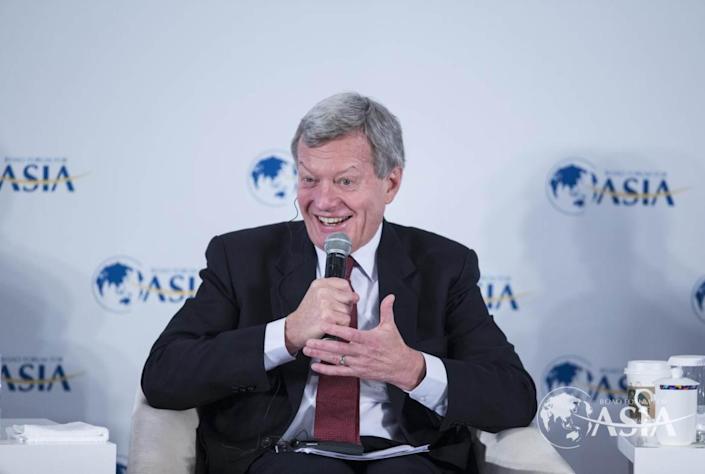US-China relations are at a “tipping point”, with the two powers on the brink of a technological and cultural cold war, former Washington ambassador to China Max Baucus warned on Tuesday.
Among the factors fuelling the downward spiral were the continuing barrage of US sanctions targeting Beijing, rising nationalism in China, growing domestic pressure in the country as Chinese President Xi Jinping seeks a third term, and a class of Chinese officials who are “hypercritical” of the US, he said.


Former US ambassador to Beijing Max Baucus. Photo: Handout alt=Former US ambassador to Beijing Max Baucus. Photo: Handout>
“We’re at a tipping point here,” Baucus told a virtual event hosted by the US-China Policy Foundation. “This current trend is very, very troublesome to me and it’s going to take a lot of work to turn that around.”
Do you have questions about the biggest topics and trends from around the world? Get the answers with SCMP Knowledge, our new platform of curated content with explainers, FAQs, analyses and infographics brought to you by our award-winning team.
Baucus served as president Barack Obama’s envoy to Beijing from 2014-2017, overseeing efforts to forge avenues of cooperation, even as tensions simmered around human rights issues and territorial disputes in the South China Sea.
Relations plummeted under Obama’s successor Donald Trump, whose trade war with Beijing and numerous other China-focused policies have largely remained intact under President Joe Biden.
“The relationship has gone downhill quite precipitously in the last several years and it’s getting worse,” said Baucus. “I thought maybe that we hit bottom after Trump [for] four years and Biden took over, but it’s still going south.”
While China extends the reach of its economic might through the Belt and Road Initiative, the US is forming alliances in Europe and the Indo-Pacific, Baucus said, expressing concern that Washington and Beijing were “just isolating each other into two separate, big camps”.
“It just seems like we’re moving more and more toward a kind of cold war. It’s not a nuclear cold war but a technological cold war, a cultural cold war.”
His warning coincides with a visit by US Secretary of State Antony Blinken to South America, where Chinese investment projects have fuelled growing scrutiny in Washington of Beijing’s development finance ambitions.
Speaking ahead of the trip, a US official said Blinken would urge Panama to remain “clear-eyed” about how China and Chinese companies engaging in 5G infrastructure would “use your data”.
US officials are also scrambling to respond to an emerging security pact between China and the Solomon Islands, an agreement that could allow Chinese warships to stop in the archipelago nation, according to a draft leaked online.
Talks this week between officials from the US, Japan, Australia and New Zealand saw all four countries agree on the “serious risks to a free and open Indo-Pacific” posed by the security framework, according to a White House readout released on Tuesday.
Meanwhile, Beijing has accused the US of “stoking bloc confrontation” within the region, with foreign ministry spokesman Wang Wenbin warning on Tuesday that “attempts to meddle with and obstruct Pacific island countries’ cooperation with China will be in vain.”
Adding further strain to already tense US-China relations is Beijing’s refusal to publicly condemn Russia’s invasion of Ukraine, complicating Washington’s attempts to lead a global, united response to the attack.
Faced with the “dire” state of US-China relations, Baucus on Tuesday implored those working on the relationship to be more “attentive” to what their counterparts were saying, decrying the steep decline in visits and communications between the two countries’ officials in recent years.
And while he was critical of what he described as the tendency of Chinese officials to adhere rigidly to talking points and restrict access for US diplomats, Baucus also spoke out against mainstream political rhetoric in the US that greater engagement with China would lead them to become “more like us”.
“We Americans tend to think we have a better idea how to run the world than other people and that’s an arrogant view,” he said.
This article originally appeared in the South China Morning Post (SCMP), the most authoritative voice reporting on China and Asia for more than a century. For more SCMP stories, please explore the SCMP app or visit the SCMP’s Facebook and Twitter pages. Copyright © 2022 South China Morning Post Publishers Ltd. All rights reserved.
Copyright (c) 2022. South China Morning Post Publishers Ltd. All rights reserved.




